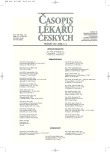-
Medical journals
- Career
Long-lasting Cardiostimulation in the Treatment of Heart Failure
Authors: M. Pšenička; E. Kejřová; J. Gandalovičová
Authors‘ workplace: II. interní klinika 1. LF UK a VFN, Praha
Published in: Čas. Lék. čes. 2006; 145: 259-263
Category: Review Article
Overview
Congestive heart failure is a major health problem reaching epidemic proportions in the industrialized world. Despite significant advances in medical therapy, prognosis still remains dim. Cardiac resynchronization therapy is a novel therapeutic approach in management of heart failure patients. Its goal is the restoration of an impaired cardiac synchrony, which can be found in high number of heart failure patients. Cardiac dyssynchrony is characterized by presence of intra and interventricular conduction delays. Cardiac synchrony can be regained by biventricular stimulation. The procedure consists of a special lead being inserted via coronary sinus to a suitable branch of cardiac veins of the left ventricle in addition to a lead in the right ventricle cavity and right atrium. Several clinical trials have demonstrated that cardiac resynchronization therapy improves functional status and quality of life in majority of patients, as well as renders a favourable impact on prognosis.
Key words:
congestive heart failure, cardiac resynchronization therapy, biventricular stimulation.
Labels
Addictology Allergology and clinical immunology Angiology Audiology Clinical biochemistry Dermatology & STDs Paediatric gastroenterology Paediatric surgery Paediatric cardiology Paediatric neurology Paediatric ENT Paediatric psychiatry Paediatric rheumatology Diabetology Pharmacy Vascular surgery Pain management Dental Hygienist
Article was published inJournal of Czech Physicians

-
All articles in this issue
- Therapy of Patients with Heart Failure – Do we Owe Anything to Our Patients?
- Long-lasting Cardiostimulation in the Treatment of Heart Failure
- Contemporary Prospects for the Diagnostics and Treatment of the Chronic Pulmonary Hypertension
- Current Approach to the Diagnostics and Therapy of Acute Coronary Syndromes
- Role of Doppler Echocardiography in the Diagnostics and Therapy of Hypertrophic Cardiomyopathy
- Mortality Downtrend Stopped During Previous Years
- Aristoteles Redivivus or Small Repetitorium of Aristotelian Methodology Regarding Problems of Psychosomatic Medicine
- Chance for Patients with Rare Diseases – „Orphan” Medicinal Products
- EBV Quantification in Children Undergoing Allogeneic Hematopoietic Stem Cell Transplantation
- Pulmonary Endarterectomy – The Surgical Treatment of Chronic Thromboembolic Pulmonary Hypertension
- Paternal Smoking and Exposure of Pre-school Children to Tobacco Smoke
- Methylene Blue in the Therapy of Vasoplegic Syndrome after Cardiac Surgery Procedure
- Larva migrans cutanea
- Purkynje Fibers of the Heart Conduction System – History and the Present Time
- Journal of Czech Physicians
- Journal archive
- Current issue
- Online only
- About the journal
Most read in this issue- Purkynje Fibers of the Heart Conduction System – History and the Present Time
- Larva migrans cutanea
- Pulmonary Endarterectomy – The Surgical Treatment of Chronic Thromboembolic Pulmonary Hypertension
- Long-lasting Cardiostimulation in the Treatment of Heart Failure
Login#ADS_BOTTOM_SCRIPTS#Forgotten passwordEnter the email address that you registered with. We will send you instructions on how to set a new password.
- Career

